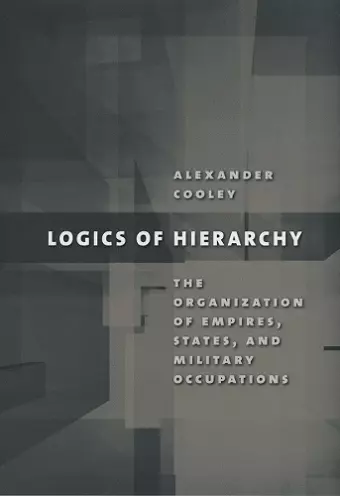Logics of Hierarchy
The Organization of Empires, States, and Military Occupations
Format:Hardback
Publisher:Cornell University Press
Published:15th Nov '05
Currently unavailable, and unfortunately no date known when it will be back
This hardback is available in another edition too:
- Paperback£21.99(9780801474835)

Political science has had trouble generating models that unify the study of the formation and consolidation of various types of states and empires. The business-administration literature, however, has long experience in observing organizations. According to a dominant model in this field, business firms generally take one of two forms: unitary (U) or multidivisional (M). The U-form organizes its various elements along the lines of administrative functions, whereas the M-form governs its periphery according to geography and territory. In Logics of Hierarchy, Alexander Cooley applies this model to political hierarchies across different cultures, geographical settings, and historical eras to explain a variety of seemingly disparate processes: state formation, imperial governance, and territorial occupation.
Cooley illustrates the power of this formal distinction with detailed accounts of the experiences of Central Asian republics in the Soviet and post-Soviet eras, and compares them to developments in the former Yugoslavia, the governance of modern European empires, Korea during and after Japanese occupation, and the recent U.S. occupation of Iraq. In applying this model, Logics of Hierarchy reveals the varying organizational ability of powerful states to promote institutional transformation in their political peripheries and the consequences of these formations in determining pathways of postimperial extrication and state-building. Its focus on the common organizational problems of hierarchical polities challenges much of the received wisdom about imperialism and postimperialism.
"In a bold thesis applied to a wide variety of contexts, Alexander Cooley argues that the distinction between forms of hierarchy is more important for politics than state actions or ideologies. The result is a work that—challenges traditional categories of political analysis by disaggregating states, empires, and globalization into their constituent hierarchical forms."—Mark Beissinger, University of Wisconsin–Madison
"Carrying the new institutional economics forward not only to relations between states but also to issues of state size, form, and type, Logics of Hierarchy is a major contribution to international relations and comparative politics. Alexander Cooley deftly uses organizational theory to illuminate the contemporary restructuring of the post-Soviet political space and beyond."—David A. Lake, University of California, San Diego
"Alexander Cooley offers an extraordinary contribution to our understanding of post-Soviet Central Asia, the collapse of Yugoslavia, the influence of Japanese colonialism on Korean development, the American occupation of Iraq, international monetary integration, tax havens, and credit-rating agencies. Cooley has developed a concise, elegant theoretical lens through which to view a truly astonishing array of international relations."—Rawi Abdelal, Harvard Business School
"Using a simple distinction in organizational form, Alexander Cooley explains sweeping variation in political institutions and outcomes. His analysis promises to make an important and controversial contribution to the study of not only empires and states but also global governance more generally."—Deborah Avant, George Washington University
"Alexander Cooley provides not only a comparative analysis of Central Asia during and after state socialism but also his observations about such seemingly disparate subjects as the 'great' empires of the past, the American experience in Iraq, and debates about the Yugoslav wars and Korean political economy. This is as unusual as it is welcome."—Valerie Bunce, Professor of Government and the Aaron J. Binenkorb Professor of International Studies, Cornell University
- Winner of Cowinner of the 2006 Marshall Shulman Prize (Ameri.
ISBN: 9780801443862
Dimensions: 229mm x 152mm x 22mm
Weight: 454g
208 pages